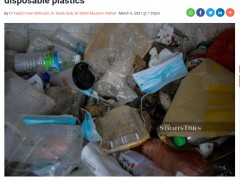Announcements

A planet in distress with discarded face masks, disposable plastics
Date : 08 March 2021
Reported by : syarel azill yaali
Category : IIUM Community
Tweet This

By Dr Fadzli Irwan Bahrudin, Dr Sarah Suib, Dr Mohd Muzamir Mahat - March 6, 2021 @ 1:35pm
March marks one year two months since the World Health Organisation (WHO) received reports on the Covid-19 outbreak in China before it became a pandemic.
Prior to that, there was a surge of intervention in plastic usage. In particular, campaigns to reduce disposable plastic products were launched by business premises, local authorities and non-governmental organisations.
For example, many retailers have charged fees for shopping bags, and eateries have ditched plastic food containers and straws. Consequently, many people started bringing reusable shopping bags. But now, the problem with single-use plastic consumption has grown.
Months before the Covid-19 outbreak, the United Nations Environment Programme used the term "Plastic Pollution Pandemic" in describing the devastating elements of plastic and microplastic pollutions and the urgent need to reconsider our plastic consumption that started way before the pandemic began.
Therefore, we are currently facing a two-fold distress. The pandemic has made plastic products more apparent as the great protectors and polluters.
Besides everyday items, such as water bottles, food packaging, shopping bags and bubble wraps from online shopping, personal protective equipment, including aprons, gloves and disposable face masks, are a new breed of post-consumer waste.
Hair salons and barbershops currently use disposable aprons to comply with the standard operating procedures of the Movement Control Order. In shopping malls, particularly in Middle East countries, disposable praying mats are provided for each visitor.
It has been estimated that if the global population takes safety measures by wearing a disposable face mask per day, billions of face masks will go to landfills in just a few months. Unlike cotton masks that may take up to five months to degrade, single-use face masks take 450 years to decompose.
Similar to the effect of other disposable plastic products, they end up in the ocean, break down into microplastics, and being ingested by our marine life. The last thing that we want to see is whales and dolphins washing up at seashores with face masks inside their guts.
The substantial increase in plastic waste during the Covid-19 pandemic has further complicated our battle in reducing plastic pollution. Yet, we must persevere and continue our fight amid our battle with the coronavirus.
As consumers, consider reusing and recycle. We can also opt for a bulk-buying system and support zero-waste stores. Disposing of our waste properly is not always a convenient act, yet one must remember that collective responsible behaviour can be "contagious" in alleviating the problem systematically.
Besides this, the municipal and government's reform agenda in minimising the devastating impact of single-use plastic consumption should continue to keep pace in the form of regulations, campaigns and promotions to be coordinated in the media.
Proper waste management systems and facilities have to be in place. Used face masks are not supposed to be dumped into recycling bins as they pose a health risk to recyclers, and it is not yet feasible to recycle them. Perhaps it is time to embed the sign of face masks in trash bins so that people are reminded to dispose of them correctly.
Undoubtedly, the Covid-19 pandemic has destabilised the global agenda in sustainable development. However, research efforts to support the plan must continue through scientific and technological inquiries that seek to commercialise alternative and sustainable materials.
Principally, sustainable materials, such as natural composites and bioplastics, are designed to minimise the dependence on finite natural resources and alleviate the typical linear production approach's negative impact. Thus, it is sensible to move to compostable plastic, especially for personal protective equipment.
It is predicted that it would take several years from now to return to the pre-pandemic era. The distribution and effectiveness of the vaccine will play a major role in this development.
Some of our new norms of living are here to stay, such as online shopping, virtual meetings, remote working and online workouts. How about plastic? Should we reimagine our plastic consumption? Can we leapfrog towards a sustainable way of living?
The younger generation may not remember a time when the unmasked face was acceptable and plastic takeaway containers were an environmental issue. It is thus critical to rethink our plastic consumption now. Otherwise, the adverse environmental crisis will continue to magnify. Every action, big or small, helps in our effort to safeguard our natural ecosystem, for us and future generations.
Dr Fadzli Irwan Bahrudin is a lecturer at Kulliyyah of Architecture and Environmental Design, International Islamic University Malaysia; Dr Sarah Suib is a Design and UX Researcher, Belgium; and Dr Mohd Muzamir Mahat is from the Faculty of Applied Sciences, Universiti Teknologi Mara.
A planet in distress with discarded face masks, disposable plastics (nst.com.my)








